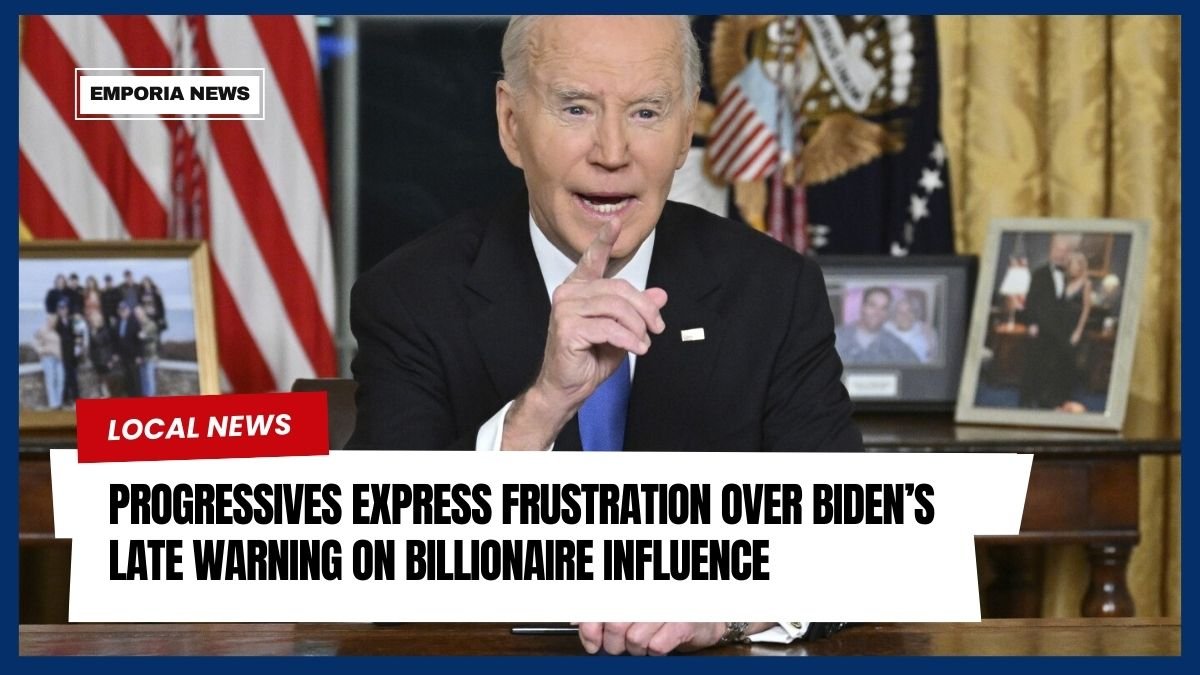For decades, the progressive wing of the Democratic Party has sounded alarms about the growing influence of billionaires over America’s wealth and political system. This week, President Joe Biden brought these concerns to the forefront during his farewell address, marking the first time a sitting president directly addressed the issue from the Oval Office.
His remarks sparked a range of reactions from progressive leaders—some expressing gratitude, others frustration. Senator Sheldon Whitehouse, D-R.I., voiced a mixed response, stating on X, “Now he tells us,” while referencing Biden’s calls for Supreme Court term limits, action against dark money, and climate reform. Whitehouse added, “I pressed four years for this speech.”
Progressive Support and Criticism of Biden’s Timing
While progressives have largely supported Biden throughout his term, many feel his statements on oligarchy come too late. Critics argue that his administration’s ties to wealthy donors and big-dollar contributors complicate his critique of billionaire influence. The frustration is further amplified as progressives contrast Biden’s warnings with his party’s occasional alignment with wealthy donors.
Nina Turner, a former co-chair of Senator Bernie Sanders’ presidential campaign, offered sharp criticism, accusing Biden of benefiting from the very system he now condemns. “It’s cowardly that after representing oligarchs for 50 years, he calls out this threat just days before leaving office,” she remarked.
The Billionaire Debate: Implications for U.S. Politics
The debate over billionaire influence is poised to shape Washington’s policies and future elections. Incoming President-elect Donald Trump, while championing working-class Americans, is assembling the wealthiest administration in U.S. history. His cabinet includes several billionaires, such as Elon Musk, whose wealth exceeds $400 billion.
Adding to the intrigue, Meta CEO Mark Zuckerberg will co-host a reception with Republican mega-donors for Trump’s inauguration. Democrats aim to counter Trump’s appeal to working-class voters by tying him to Musk and other billionaires.
Biden’s Address: A Call Against Oligarchy
In his farewell address, Biden painted a stark picture of America’s political future. He declared that an oligarchy of extreme wealth and power threatens democracy, fundamental rights, and economic fairness. Flanked by Vice President Kamala Harris and his family, Biden warned against the dangers of unchecked power in the hands of a few ultra-wealthy individuals.
Despite his strong words, Biden’s acknowledgment of “oligarchy” is unprecedented during his presidency, leaving some progressives questioning why it took him so long to raise this issue.
Divided Responses Within the Democratic Party
The response to Biden’s remarks varied within the Democratic Party. Figures like Tiffany Muller, executive director of End Citizens United, praised the focus on oligarchy but acknowledged that both political parties have benefited from big-money donors. She noted that while Citizens United has enabled billionaires to influence politics, Trump has uniquely elevated his wealthy backers to key government positions.
Meanwhile, Senator Bernie Sanders commended Biden’s recognition of oligarchy, using the speech as a launching point to question Trump’s Treasury Secretary pick, billionaire Scott Bessent. “When so few people control so much wealth and power, isn’t that oligarchy?” Sanders asked during the confirmation hearing.
Contradictions and Critiques of Biden’s Legacy
Critics like Jeff Hauser, executive director of the Revolving Door Project, highlighted contradictions in Biden’s record. They pointed to his decisions to honor billionaires like George Soros and Ralph Lauren with the Presidential Medal of Freedom while condemning the billionaire class. Similarly, Vice President Harris’ campaign leaned on billionaire support, including Mark Cuban, although Cuban’s role was less significant than Musk’s alignment with Trump.
Marianne Williamson, a former Democratic primary challenger, dismissed Biden’s warnings as too little, too late. “This is news?” she quipped, emphasizing that America has long been an oligarchy shaped by tech billionaires and corporate elites.
Progressive Movement’s Mixed Reactions
Despite criticism, some progressives saw Biden’s speech as a pivotal moment. Adam Green of the Progressive Change Campaign Committee likened it to President Eisenhower’s warning about the military-industrial complex. Green viewed Biden’s remarks as a call to action that could resonate for years.
Key Figures and Their Roles in the Oligarchy Debate
| Figure | Role | Key Actions/Remarks |
|---|---|---|
| President Joe Biden | Outgoing U.S. President | Warned of an emerging oligarchy in America during his farewell address. |
| Senator Bernie Sanders | Vermont Senator and Democratic Socialist | Thanked Biden but emphasized decades-long warnings about oligarchy. |
| Elon Musk | Billionaire, CEO of Tesla and X | Criticized for close ties to Trump and influence in U.S. politics. |
| Nina Turner | Former Co-chair of Sanders’ Campaign | Criticized Biden’s late acknowledgment of oligarchy. |
| Tiffany Muller | Executive Director, End Citizens United | Highlighted bipartisan influence of billionaire donors post-Citizens United. |
President Biden’s farewell address brought the issue of oligarchy into sharp focus, reigniting debates about the influence of wealth in American politics. While his remarks resonated with some progressives, others criticized the timing and sincerity of his concerns. As both parties grapple with the role of big money in politics, the challenge of addressing oligarchic power remains a pressing issue for the future of democracy.




